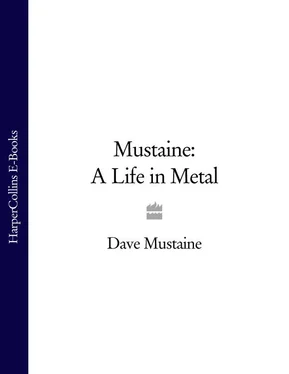For a while, at least, I tried to fit in with the Witnesses, although from the very beginning it seemed like some giant, multilevel marketing scheme: you sell books and magazines, door-to-door, and the more you sell, the loftier your title. Total bullshit. I was eight, nine, ten years old, and I was worried about the world coming to an end! To this day I still have trauma caused by the Jehovah’s Witnesses. I don’t get all excited around Christmas, because I still have a hard time believing everything that goes along with the holiday (and I’m speaking as a man who now considers himself a Christian). I want to. I love my kids, I love my wife, and I want to celebrate with them. But deep down inside, there is doubt and skepticism; the Witnesses fucked it up for me.
WHAT DO YOUdo when you’re a lonely kid, a boy surrounded by women, with no father or even a father figure? You make shit up, create your own universe. I played with a lot of plastic models—miniature replicas of Jack Dempsey and Gene Tunney, whose rivalry was re-created nightly on the floor of my bedroom; tiny American soldiers stormed the beach at Normandy or invaded Iwo Jima. Sounds weird, right? Well, this particular world, the world in my head, was the safest place I could find. I don’t mean to sound like a victim, because I’ve never felt that way. I think of myself as a survivor. But the truth is, every survivor endures some shit, and I was no exception.
Sports provided a glimmer of hope. Bob Wilkie, the chief of police in Stanton, California, was married to my sister Suzanne. Bob was a big, athletic guy (about six foot four, two hundred pounds), a former minor-league baseball player, and he was, for a time, something of a hero to me. He was also my first Little League baseball coach. Bob’s stepson Mike (my nephew—how weird is that?) was the team’s best pitcher; I was the starting catcher. I loved baseball from the very beginning. Loved putting on the hardware, directing the action from behind the plate, protecting my turf as if my life depended on it. Other kids would try to score and I would beat them down. I wouldn’t do anything illegal, but I would put the fear of God into them if they tried to get past me. And I could hit—led the league in home runs that first season.
I don’t mean to imply that I was destined for greatness in baseball, but I do think I could have been a jock if I wanted. Unfortunately, there was no stability in my life, and whatever extracurricular activities I chose to pursue, I did so largely without help. We would live with Suzanne for a while, until Dad would find us, and then we’d move out on our own, until the money ran out and we got evicted, and then we’d move in with Michelle or with my aunt Frieda. That was the cycle. One move after another, one home after another.
I wasn’t lazy. Far from it, actually. I picked up a paper route to pay for some of my baseball gear and registration fees, and then I added a second route so I’d have some extra money for food and whatever else I might need. During that period we moved from Garden Grove down to Costa Mesa; both of my paper routes were in the Costa Mesa area, but my baseball team was in Garden Grove. So I’d routinely spend the afternoon on my bike delivering papers and then ride my bike up to Garden Grove—a distance of some ten miles—for baseball practice. Then I’d ride back home and fall asleep. The end of that insanity came near the end of the season, when our coach, having exhausted all pitching options during one particularly ugly game, ordered me to the mound.
“But I’m not a pitcher,” I said.
“You are now.”
I wasn’t trying to be an arrogant prick or anything. It’s just that I was exhausted and in no mood to play a new position; I didn’t want to deal with the learning curve or the embarrassment and then have to pedal all the way back home, dejected and pissed off.
So I played, and I walked in several runs. And that, as it turned out, was one of my very last baseball games.
MUSIC WAS ALWYSthere, sometimes in the background, sometimes inching forward. Michelle had married a guy named Stan, who I thought was one of the coolest guys in the world. He was a cop, too (like Bob Wilkie), but he was a motorcycle cop, and he worked for the California Highway Patrol. Stan would get up in the morning and you’d hear the leather squeaking, the gestapo boots smacking against the floor, and he’d get on his Harley, fire it up, and the whole neighborhood would rattle. No one ever complained, of course. What could they do—call a cop? I liked Stan a lot, not just because of the Harley and the fact that he was clearly not someone you’d want to mess with, but also because he was a genuinely decent man with a real fondness for music. Every time I went to Stan’s house, it seemed that the stereo was roaring, filling the air with the sounds of the great crooners from the sixties: Frankie Valli, Gary Puckett, the Righteous Brothers, Engelbert Humperdinck. I loved listening to those guys, and if you think that seems odd for a future heavy metal warrior, well, think again. I don’t doubt for a second that the sense of melody that would inform Megadeth took root back in Stan’s house, among other places.
My sister Debbie, for example, had a terrific record collection, mostly hook-laden stuff by the pop stars of that era: Cat Stevens, Elton John, and of course the Beatles. That kind of music was always in the air, sinking into my skin, and when Mom gave me a cheap acoustic guitar as a present for graduating from elementary school, I couldn’t wait to start playing. Debbie had some sheet music laying around, and before long I had taught myself some rudimentary chord progressions. Nothing great, of course, but respectable enough for the songs to be recognizable.
For a long time Debbie was my best friend, the person with whom I spent most of my time. She’d come home from school and we’d hang out together, watch TV, play music (Debbie on piano, me on guitar). We leaned on each other when things got hard; we also fought like siblings do, with Debbie usually getting the better of me in our disagreements.
As Debbie grew up and began dating, and eventually fell in love with a guy named Mike Balli, I was left behind. She was seventeen years old when they married. I knew even then it wouldn’t last, and of course it didn’t. Anyone who met Mike and saw him with Debbie knew it was a relationship doomed to fail. Whatever chemistry there was quickly evaporated, and they were left with an unbalanced union just waiting to die. Debbie was strong and dominant; she basically called the shots—a Big Momma kind of thing.
But Mike had his positive attributes, especially to a fourteen-year-old aspiring guitar player. For one thing, his mother was in some way related to Jack Lord, who at the time was the star of the hit television show Hawaii Five-O. In 1974, it didn’t get a lot cooler than Steve McGarrett, and Mike didn’t mind dropping the guy’s name in casual conversation: “Dude, McGarrett’s like…my second cousin or something!” Can’t say I blame him. I would have done the same thing. Mainly, though, what I liked about Mike was the fact that he could play electric guitar, and he didn’t mind playing with me. Admittedly, his guitar was a complete piece of crap; it was called a Supra, and it was a ridiculous sunburst red, with three pickups, but it served its purpose. To my still uneducated ears, he seemed to be a fairly decent player.
Mike’s little brother Mark was also a musician. He played bass in a band with a guy named John Voorhees (who later did a stint with a fairly successful band called Stryper). Mark and John heard me playing, asked if I might be interested in joining them.
“Sure,” I said. “Just one problem.”
“What’s that?”
Читать дальше







